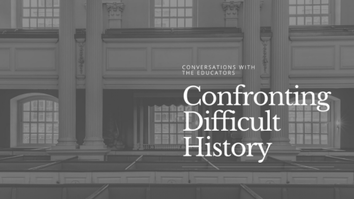|
By Faye Charpentier, History Program Director  On June 11, King’s Chapel History Program staff, King’s Chapel clergy, and congregants engaged in an important conversation about the importance of confronting difficult history. This event was part of a larger conversation about the role and relevance of history to our present moment. As we look towards current events these past few weeks, the difficult histories of both our nation and this church have weighed on many of our minds. The systemic racism, police brutality, and white supremacy in the world are all historically rooted. The study of these histories not only helps us understand how we got here, but can empower us to confront these issues head-on, and shape our anti-racism work today. A James Baldwin quotation from “Unnamable Objects, Unspeakable Crimes,” has been frequently shared on social media lately: The great force of history comes from the fact that we carry it within us, are unconsciously controlled by it in many ways, and history is literally present in all that we do. This sentiment is especially true of “difficult,” or “hard,” history: history that is difficult to process, may challenge our understanding of past and present, or as put by Magdalena Gross and Luke Terra, “surface fundamental disagreements over who we are and what values we hold.” Examples include war, genocide, colonialism, mass violence, slavery, and racial injustice. The visceral emotional responses and cognitive dissonance people have when exposed to hard history are some of the reasons why we need to confront them. Difficult history is like mold or termite damage -- if you continue to ignore the roots of the issue or continue to cover it up, it will continue to eat away or grow more toxic until the structure is beyond repair. But there is another approach: looking at it in the eye and confronting it head on, whether that means working to dismantle and rebuild, or to mediate the concern. Looking at difficult history in this light - towards confronting it, seeking to understand and address its roots, working to rebuild and mediate, and teaching others along the way - is part of the power of studying history. Studying difficult histories in particular empowers us to reconcile with the wrongs of history and evaluate our place in the present as we move forward, informed by this history, to work towards a just and equitable future. Over the past three years, King’s Chapel has been skimming the surface of its difficult history through research conducted by the History Program, and work of the Ad Hoc Committee on Slavery and King’s Chapel. An example of this difficult history that particularly resonates today, for example, is historically the church’s institutional silence and attempts at neutrality on the day’s political issues in the 1840s and 1850s, particularly in the context of the Fugitive Slave Act of 1850. There are uncanny similarities today with the brutality and protests around the country and in Boston surrounding the imprisonment of formerly enslaved men like Thomas Sims and Anthony Burns. Yet at that time, the church strived to maintain neutrality, not question the status quo or speak out against unlawful laws. In another buzzy quotation of the moment, from Desmond Tutu, “If you are neutral in situations of oppression, you have chosen the side of the oppressor.” And, at that time, and in the current historical interpretations of that era in history, Tutu’s view is how the minister and church members were viewed both by their contemporaries at the time and by historians today. But looking critically at moments like these in our history -- and these are not at all histories unique to King’s Chapel -- the intention is not to produce guilt or shame, but to bring light to the consequences of such actions and learn from them moving forward. Part of learning from difficult history is learning about and acknowledging shortcomings in the pursuit of progress. Past is present, and understanding how systems that exist today were created and institutionalized teaches us about how these systems of oppression can be addressed and even dismantled. For instance, we are seeing this recently in conversations about police and prison abolition through learning about the problematic histories of these institutions in America. Confronting difficult history, though challenging, is crucial to approaching the current and future world. While there are different approaches to undertaking the task of dismantling our understanding of history and getting at the roots, there are many organizations dedicated towards this work, ranging from historic sites to resources for primary and secondary educators. While this organization is just embarking on this journey, we can seek inspiration and guidance from the excellent work being done around the world relating to the question of history’s relevance today and the importance of facing the difficult past. The following are just a few of many organizations confronting past and present head on. Please consider learning about these organizations and considering what inspiration can be drawn from their work as we look towards examining our own history: International Coalition of Sites of Conscience
1 Comment
|
King's Chapel History ProgramDive deeper into King's Chapel's 337 year history on the History Program blog. Archives
July 2023
Categories
All
|
 RSS Feed
RSS Feed